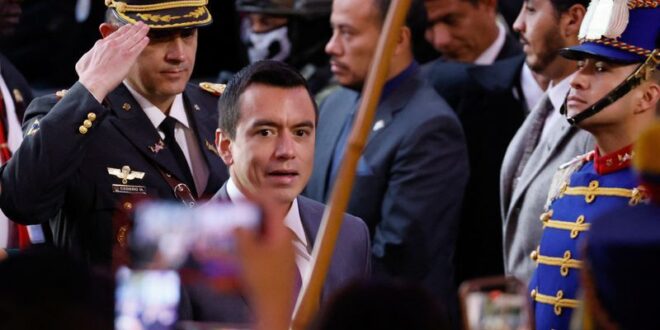QUITO (Reuters) -Ecuadorean President Daniel Noboa is seeking voter support on Sunday for a raft of security measures in a national referendum, as he battles spiking violence that has made international headlines and left a man dead even as voters went to the polls.
Ecuador’s prisons agency said on Sunday afternoon that the director of a prison in Portoviejo, in the country’s western Manabi province, was killed, without giving further details.
The death of director Cosme Damian Parrales comes as citizens head to the polls to vote on measures including joint police-military patrols, the extradition of wanted criminals and longer sentences for terrorism and murder, among other crimes, to fight rising violence attributed to drug trafficking gangs.
Polling has suggested voters are more likely than not to support the measures put forward by Noboa, 36, in the 11-question referendum, though recent power cuts may dampen support. Five of the measures would modify the constitution if passed.
“The result of this referendum will define the course of the policy we will take,” Noboa said at an inauguration event launching the vote. “As governors we will be obliged to abide by this.”
Some pollsters have warned that daily hours-long power cuts Noboa ordered this week amid drought-related energy shortages could harm his image and potentially the “yes” vote. Most of Ecuador’s energy is from hydropower.
Ecuador’s CNE electoral council said that by mid-afternoon some 60% of voters had come to the polling booths and voting had closed in nearly half of polling places abroad.
Strong rains have affected installation of some 15 voting centers across eight of the country’s provinces, it said, though in much of these the problems had been overcome, it said.
CNE President Diana Atamaint said voting had taken place in “an atmosphere of security and tranquility.”
‘RADICAL CHANGE’
Cocaine-smuggling gangs have expanded into every corner of Latin America over the last decade, turning once-tranquil nations like Ecuador into new battlegrounds, security officials and diplomats say.
In January, violence in Ecuador captured world attention when gunmen stormed a live television broadcast and scores of prison staff were taken hostage.
Rafaella Jaramillo, 23, a student from the country’s largest city Guayaquil, said on Sunday she planned to vote in favor in order to “cut the legs out” from under crime.
“We want a radical change in our country’s security and the referendum is a strong weapon to fight against crime,” she said.
“The country needs support to move forward for everyone,” added Aracely Rosado, 59, in Quito. “The referendum will help us a lot.”
Voters will also weigh whether there should be tougher gun controls in areas close to prisons, no parole for crimes like kidnapping or terrorism financing, among others, and whether the military should be able to use confiscated weapons.
The referendum also includes a measure which would allow workers to be contracted by the hour, which opponents say will benefit the rich and international companies, and another recognizing international arbitrage.
Some voters were skeptical.
Guayaquil-based teacher Susana Giraldo, 30, said she believed the referendum would not solve security overnight and was being used as a method to pass laws in favor of companies and the rich.
Passing the hourly contract law would be “a crime for poor Ecuadoreans,” she said.
In Quito, however, Juan Carlos Izquierdo, 55, said he believed the law could help give work to people who have none.
“This country is full of surprises,” he said. “Let’s hope this referendum is worth the effort and makes a positive change in Ecuador.”
(Reporting by Alexandra Valencia in Quito; Additional reporting by Tito Correa in Quito and Yury Garcia in GuayaquilWriting by Julia Symmes Cobb and Sarah MorlandEditing by Matthew Lewis and Josie Kao)
 BeritaKini.biz Berita Viral Terkini di Malaysia
BeritaKini.biz Berita Viral Terkini di Malaysia





